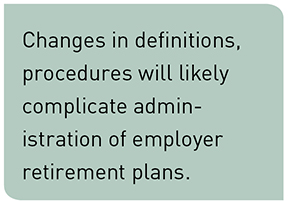HOME | ABOUT US | MEDIA KIT | CONTACT US | INQUIRE
HOME | ABOUT US | MEDIA KIT | CONTACT US | INQUIRE


The Affordable Care Act is well on its way to full implementation: The U.S. Supreme Court has spoken, and key aspects of the ACA survived a significant legal challenge earlier this summer. Although there is a continued focus on health-care reform, it would be a mistake for employers and human-resource professionals to overlook what’s happening with retirement plans. Several key regulatory developments are affecting retirement plans, and employers will want to keep an eye on them.
The Department of Labor recently held hearings and closed out an extensive comment period on its proposed new definition of an investment-advice fiduciary under the Employee Retirement Income Security Act of 1974. An ERISA fiduciary—an investment manager or other entity that takes on fiduciary responsibilities with respect to a retirement plan—is subject to strict conflict-of-interest rules.
The current definition of an ERISA fiduciary, in use since 1975, is fairly narrow. This past April, the Labor Department released a new proposal to significantly expand the definition, and the new rule would cover IRAs as wells as employer-sponsored retirement plans. The rule has drawn both praise and criticism from many different areas of the retirement marketplace, including industry advocacy groups, members of Congress, financial service firms, and others.

The department has stated informally that it expects to make adjustments to the proposal, but the extent of any changes is unknown. Although the most direct impact of the proposed rule—if finalized—may be on financial-service firms providing investment advice, employers will also want to be aware of this potential change, as it ultimately may affect their relationships with consultants, brokers, and others who service their retirement plans.
Retirement plans with 100 or more participants generally must be audited each year by an independent qualified public accountant as part of the plan’s annual Form 5500 report filing. The Labor Department recently released a report indicating that 39 percent of Form 5500 audits it studied had significant deficiencies in one or more generally accepted auditing standards. The department indicated that it plans to focus its enforcement resources on smaller audit firms that undertake audits of plans with large assets. Among its other recommendations, it also indicated that it expects to work with national accountancy and CPA firms to increase training and education, as well as investigations and sanctions for CPAs who perform poor work. Employers may wish to carefully consider the department’s findings when selecting or working with an auditor for a retirement plan.
Many employer-sponsored retirement plans permit participants to take loans or hardship withdrawals from retirement-plan balances. The Internal Revenue Service recently reminded plan sponsors that the responsibility for maintaining appropriate documentation for these types of transactions lies with the plan sponsor, even if a third-party administrator is utilized to administer the plan.
The IRS also noted that a practice known as electronic “self-certification” by a participant is not sufficient documentation of a hardship. Employers should review processes and agreements with service providers to ensure that proper documentation exists in case of an IRS audit.
The IRS recently announced that it will significantly reduce its determination letter program in 2017. A favorable determination letter from the IRS is a way for a sponsor who uses an individually-designed plan document (as opposed to a pre-approved or prototype plan document) to gain assurance from the IRS that the plan document is legally sufficient or “qualified.”
Limited resources at the IRS have prompted officials to re-evaluate the program. Going forward, only newly-adopted or terminating plans will be reviewed (the IRS has also indicated it may perform reviews in other limited circumstances). Although the full effect of this change is not yet known, it may prompt more plan sponsors to consider using pre-approved plan documents in the future.
Employers who sponsor retirement plans for employees would be well-served to keep an eye on these regulatory developments. Don’t let health-care reform be your only focus!